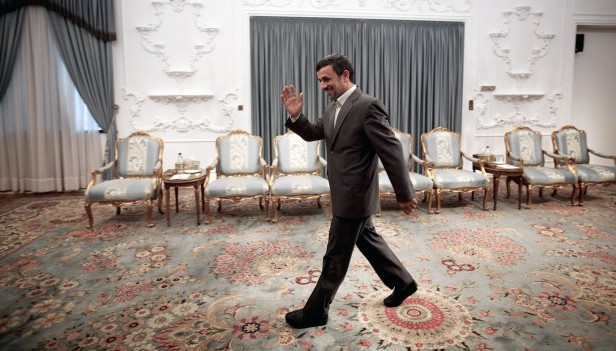
Iranian President Mahmoud Ahmadinejad waves as he arrives for a meeting in Tehran on June 23, 2013. Ahmadinejad is coming to the end of his second term as president of Iran with his newly elected successor Hassan Rowhani set to be inaugurated in August after winning outright victory in the June 14 presidential election (AFP PHOTO/BEHROUZ MEHRI)
With little following in the Iranian parliament, and with his chosen successor excluded from June’s presidential election by his opponents in the upper echelons of the Iranian state, the controversial president faces the prospect of his ideas, influence and followers being thoroughly purged from Iran’s body politic.
Iran’s next president, Hassan Rouhani, is due to be sworn in at the start of August. With only weeks of his administration left, Ahmadinejad attempted to put forward his view of the past eight years during a ceremony to mark his time in office, broadcast on channels controlled by Islamic Republic of Iran Broadcasting (IRIB), a state-run radio and TV corporation.
As he did throughout of his administration, Ahmadinejad struck a defiant tone, and sought to portray his frequently controversial rhetoric, which was roundly criticized as unnecessarily confrontational and divisive by candidates in the recent election. In his remarks during the ceremony, he sought to portray his hostility to the US and Israel as part of a wider left-wing, anti-imperialist struggle.
Ahmadinejad said: “some people differentiate these two and urge we should focus on Iran issue and forget the world. However, we believe that these two inseparable issues. We act within an international system and cannot isolate ourselves from the rest of the world. The Soviet Union did the same thing.”
“Slavery, colonialism and expansionism are the current problems of the contemporary world. It is self-deceiving if we say the world is not facing such problems today,” Ahmadinejad added.
“For instance, Iran plans to amend its economy and has the potential to grow into a developed country. However, the West manipulates Iran’s prosperity by imposing sanctions on the country under various pretexts.”
“Under the severest financial crisis and under sanctions, my government reversed the stream of capitalism. The subsidies plans helped to distribute the wealth among the poor.”
Ahmadinejad also attempted to burnish his democratic credentials, despite the widespread belief in Iran and abroad that the 2009 election, in which he won a second term, had been rigged in his favour by Iran’s conservative establishment, and the outcry that followed the crushing of the widespread protests that followed the election.
He said: “everyone has a say in the country, including critics. Critics and the opposition must be able to express their opinion with a sense of freedom and dignity. The ninth and tenth governments [his two terms as president] respected freedom and never felt threatened by criticism against them.”
“Basically my administration helped the media the most. I never deprived anyone for their opposition to the government,” the Iranian president said.
“In the year 2009, I constantly told my colleagues at the Interior Ministry that no one broke the law when it comes to people’s vote. Such a system has been approve and trusted by the people.”
Elsewhere, another part of Ahmadinejad’s legacy in Iran was on show: the deep divisions that emerged within the conservative camp, fueled in large part by the disagreements between Ahmadinejad, and Iran’s supreme leader, Ayatollah Ali Khamenei, and his followers, known as “principalists.”
Gholam Hadded-Adel, the speaker of parliament in Ahmadinejad’s first term, and a conservative-principalist candidate in the recent presidential election, spoke out against Ahmadinejad on Saturday.
“As a parliament speaker . . . I had keep the unity among the conservatives. It was a very difficult task with Ahmadinejad being the president. Ahmadinejad did not fit in any definitions and had his own approach,” he told IRIB.
“Ahmadinejad dejected by me trying to stand by the parliament. I stood by the people and by the constitution to avoid any tension. Still, Ahmadinejad did not like my approach,” he added.
During his interview, Haddad-Adel also implied the reason why a conservative candidate did not win the election was that, unlike Iran’s reformists and moderates, the conservative camp did not get behind a single candidate.
Haddad-Adel withdrew from the race at a relatively early stage, but other high-profile conservative candidates from the same faction, Tehran mayor Muhammad-Baqer Qalibaf, and former foreign minister Ali Abkar Velayati, remained in the race.
“I withdrew from the election to help the coalition move forward. Either Qalibaf or Velayati must have withdrew to leave one candidate for the election,” he said.
However, Haddad-Adel’s comments were disputed by Velayati, who released a statement saying that Haddad-Adel had dropped out of the race due to low poll ratings, saying: “He did not withdraw in favor of an individual or in favor of the coalition.”
